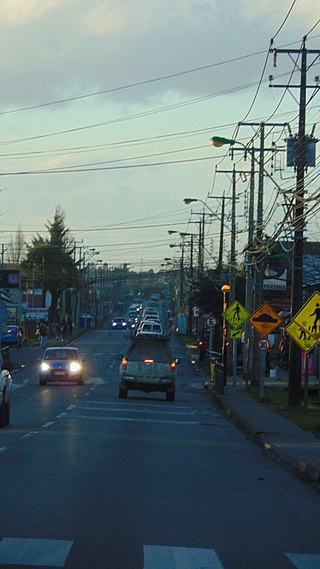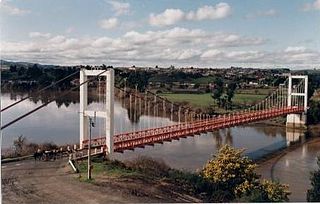
Fitzroya is a monotypic genus in the cypress family. The single living species, Fitzroya cupressoides, is a tall, long-lived conifer native to the Andes mountains and coastal regions of southern Chile, and only to the Argentine Andes, where it is an important member of the Valdivian temperate forests. Common names include alerce, lahuén, and Patagonian cypress. The genus was named in honour of Robert FitzRoy.

Alerce is a Chilean town in the communes of Puerto Montt and Puerto Varas in Llanquihue Province, Los Lagos Region.

San Carlos de Bariloche, usually known as Bariloche, is a city in the province of Río Negro, Argentina, situated in the foothills of the Andes on the southern shores of Nahuel Huapi Lake. It is located within the Nahuel Huapi National Park. After development of extensive public works and Alpine-styled architecture, the city emerged in the 1930s and 1940s as a major tourism centre with skiing, trekking and mountaineering facilities. In addition, it has numerous restaurants, cafés, and chocolate shops. The city had a permanent population of 108,205 according to the 2010 census. According to the latest statistics from 2015, the population is around 122,700, and a projection for 2020 estimates 135,704.

Puerto Montt is a port city and commune in southern Chile, located at the northern end of the Reloncaví Sound in the Llanquihue Province, Los Lagos Region, 1,055 km to the south of the capital, Santiago. The commune spans an area of 1,673 km2 (646 sq mi) and has a population of 245,902 in 2017. It is bounded by the communes of Puerto Varas to the north, Cochamó to the east and southeast, Calbuco to the southwest and Maullín and Los Muermos to the west.

Broumov is a town in Náchod District in the Hradec Králové Region of the Czech Republic. It has about 7,200 inhabitants. There are three important historic buildings, protected as national cultural monuments: the Benedictine monastery, the Church of the Virgin Mary and the Church of Saint Wenceslaus. The historic town centre is well preserved and is protected by law as an urban monument zone.

Frutillar is a city and commune located in southern Chile, Chilean Patagonia, in Llanquihue Province, within the Los Lagos Region, the lake district. The bay of Frutillar is placed on the banks of Lake Llanquihue, the largest lake entirely within Chile. Frutillar is known as the "City of Music", and since 2017 is part of the UNESCO Creative Cities Network (UCCN), becoming the first Chilean city to be nominated, as well as the southernmost Creative City of Music in the world.

Llanquihue Province is one of four provinces of the Chilean region of Los Lagos (X). Its capital is Puerto Montt. Chile's second largest lake, Lake Llanquihue, is located in the province as well as four volcanoes: Osorno, Calbuco, Puntiagudo and Cerro Tronador.

Puerto Varas, also known as "La Ciudad De Las Rosas" or “The City Of Roses”, is a city and commune located in the southern Chilean province of Llanquihue, in the Los Lagos Region.

Osorno Volcano is a 2,652-metre-tall (8,701 ft) conical stratovolcano lying between Osorno Province and Llanquihue Province in the Los Lagos Region of southern Chile. It stands on the southeastern shore of Llanquihue Lake, and also towers over Todos los Santos Lake. Osorno is considered a symbol of the local landscape and, as such, tends to be the referential element of the area in regards to tourism. By some definitions, it marks the northern boundary of Chilean Patagonia.

Calbuco is a stratovolcano in southern Chile, located southeast of Llanquihue Lake and northwest of Chapo Lake, in the Los Lagos Region, and close to the cities of Puerto Varas and Puerto Montt. With an elevation of 2,015 meters above sea level, the volcano and the surrounding area are protected within the Llanquihue National Reserve.

Moraleda Channel is a body of water separating the Chonos Archipelago from the mainland of Chile. It is located at 44.4147222°S 73.4205556°W, leading to Gulf of Corcovado. Southward from the mouth of the Aisén Fjord, Moraleda Channel divides into two arms. The east arm, called Canal Costa, is the main one. Farther south the name changes to Estero Elefantes, which terminates in the gulf of the same name. The channel runs along the Liquiñe-Ofqui Fault.

The Archdiocese of Puerto Montt is a Metropolitan See of the Roman Catholic church, in Chile. Its suffragan dioceses are: Osorno, San Carlos de Ancud and Punta Arenas.
German Chileans are Chileans descended from German immigrants, about 30,000 of whom arrived in Chile between 1846 and 1914. Most of these were from Bavaria, Baden and the Rhineland, and also from Bohemia in present-day Czech Republic, which were traditionally Catholic. A smaller number of Lutherans immigrated to Chile following the failed revolutions of 1848.

Imperial River is a river located in the La Araucanía Region of Chile. It is formed at the confluence of the Chol Chol and Cautín Rivers in the vicinity of the city of Nueva Imperial.

Since the mid-1990s, tourism in Chile has become one of the main sources of income for the country, especially in its most extreme areas. In 2005, this sector grew by 13.6%, generating more than US$500 million, equivalent to 1.33% of the national GDP.

Llanquihue is a Chilean commune and city in Llanquihue Province, Los Lagos Region. The city lies on the western shore of Lake Llanquihue, where the Maullín River starts. It is located 7 kilometres (4.3 mi) north of Puerto Varas and 19 kilometres (12 mi) south of Frutillar and is connected to both cities by Chile Highway 5.
From 1850 to 1875, some 30,000 German immigrants settled in the region around Valdivia, Osorno and Llanquihue in Southern Chile as part of a state-led colonization scheme. Some of these immigrants had left Europe in the aftermath of the German revolutions of 1848–49. They brought skills and assets as artisans, farmers and merchants to Chile, contributing to the nascent country's economic and industrial development.

The Lutheran Church in Chile is one of the two denominations of Lutheranism in Chile. It separated from the historical Evangelical Lutheran Church in Chile (IELCH) in 1975 due to differences in political perceptions of the pastors and bishops during the beginning of the military dictatorship led by Augusto Pinochet. It is a member of the Lutheran World Federation, which it joined in 1991. Most congregations are bilingual in German and Spanish.

Chiloé Wind Farm is a wind farm planned to be constructed by chilean renewable energy developer Ecopower in a sector called Mar Brava west of Ancud in Chiloé Island, Chile. Chiloé Wind Farm is one four large wind farm projects approved by Sistema de Evaluación de Impacto Ambiental (SEIA) in the period of 2010–2017, and if constructed it would be the largest wind farm in the whole Chiloé Archipelago. The project included the construction of 42 wind turbines and with a power generation of 100 MW.

















